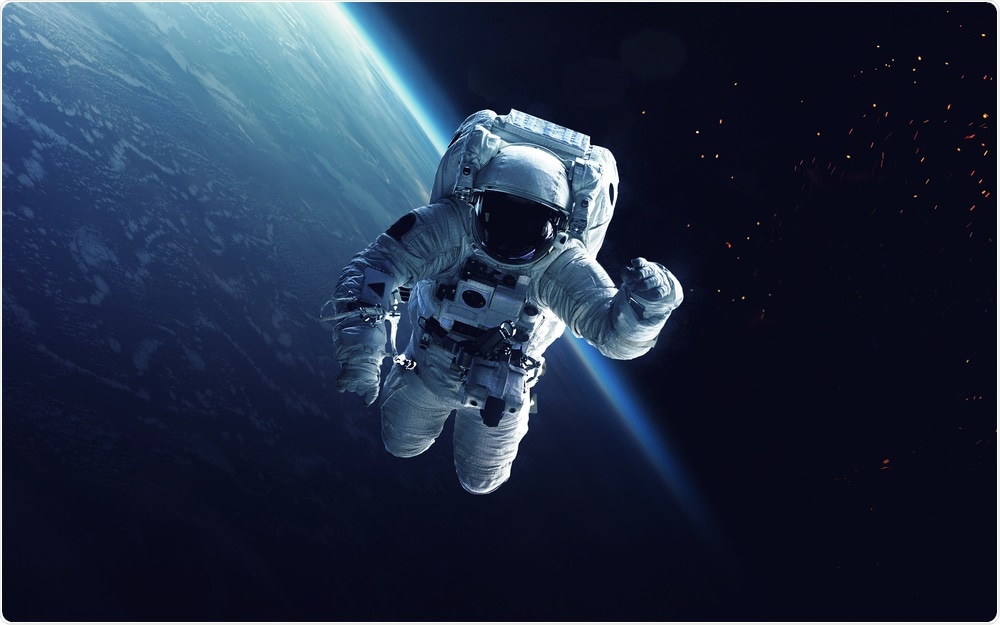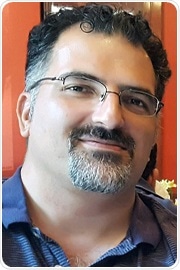Produced in Partnership with NASAJan 29 2021
In this interview, News-Medical speaks to Dr. Afshin Beheshti from NASA about his latest research that investigated whether changes in mitochondria could cause health problems in Space.
What provoked your research into health problems experienced in Space and what might be causing them?
Currently, it is one of NASA’s priorities to determine health risks in long-term space travel. In deep space, there are many other factors that we do not experience on Earth, with two main components being microgravity and space radiation. This will produce a vastly different biological response than what humans are used to on Earth. It is known that the space environment will increase health risks to a large number of different factors, such as cardiovascular health risks, central nervous system issues, muscle degenerations, etc.
So when we started this work our goal was to determine if there might be a master biological switch that is turned on in the body that can account for all the different health problems that are occurring in space.

Astronaut in Space. Image Credit: Vadim Sadovski/Shutterstock.com
How is the body impacted when in space?
In space, our body experiences weightlessness from the microgravity component, and also damage can be caused by space radiation.
Space radiation is comprised of heavy ions that are traveling in space caused by mainly 3 different components: 1) heavy ions and high energy protons from galactic cosmic rays that are floating around in space (caused by supernovas and other sources). These heavy ions can travel through shielding on the space station and spacecraft and also through the skin to cause damage to a person’s cells; 2) Solar particle events caused by solar flares. These are comprised of a large dose of protons; and 3) radiation trapped in our Earth’s magnetic field or also referred to as Low Earth Orbit (LEO) where the International Space Station is located.
In general, the combination of these two events in space have been known to increase health risks associated with: cardiovascular disease, muscle degeneration, bone loss, central nervous system issues, increased cancer risk, ocular issues, microbial gut changes, suppression of the immune system and increase inflammation, and even has been reported to induce a change in smell and taste (similar to what patients with COVID-19 experience).
These health risks are induced by biological changes that are unique to the space environment.
How did you carry out your research into the impacts of space on health?
One of the hats I wear at KBR/NASA’s Ames Research Center in California’s Silicon Valley is being involved with the development of NASA Space Biology’s GeneLab platform (https://genelab.nasa.gov/). This is discussed below in detail. The other role I have is working on my projects and grants related to space biology issues. Specifically for the work related to mitochondrial impact, GeneLab has setup Analysis Working Groups (AWGs), which are comprised of scientists from all around volunteering to work on optimizing analysis pipelines and workflows for GeneLab.
In addition, these scientists also work on interesting space biology scientific questions. There is 4 AWGs total and I lead the Multi-omics AWG. Since we have a diverse group of brilliant scientists, I approached the group with a question on utilizing GeneLab to determine if we might be able to determine a master biological switch that can occur in the body in the space environment.
Using unbiased and independent analysis from different data available from GeneLab, we looked at multiple different tissues from data gathered from mice and cells flown to space at different biological levels (i.e. proteins, DNA, and RNA). We also approached other collaborators that had access to astronaut physiological data from astronauts. This resulted in having the largest set of astronaut data to be compiled and published in a paper. This was used to confirm the results we determined from the cell and mice experiments.
Lastly, we also had access to the data from the NASA Twin Study (specifically from Chris Mason who is the PI on the NASA Twin Study), to have further confirmation and relationship from the mice results to humans. The overall design and data involved from all these studies provided strong evidence and rationale of what we were finding.
What did you discover?
We discovered that mitochondrial dysfunction was a key driver of biological changes that occur in space. The mitochondrial dysfunction was universal in all the tissues studied and also the results translated to the human data from astronauts and the NASA Twins. These changes led to a downstream impact on the immune system, lipid accumulation, circadian rhythm issues, cell-cycle dysregulation, and more.
It was determined that mitochondrial dysfunction is upstream from the changes that have routinely been observed and using our results can help explain how a lot of these changes can be linked upstream to one thing.
Why are the mitochondria such a vital component of cells?
Mitochondria is a key resource in the cell for your bioenergetics. A healthy functional mitochondria system in your body is necessary for maintaining a healthy status in an individual and a person’s longevity. Basically, the mitochondria are the powerhouse in your body that generates most of the energy needed to maintain and power the cell's functions through biochemical reactions.
Deficient mitochondrial reduce the energy levels in a person and cause downstream issues in your cells that can lead to the onset of diseases. It also can determine how well a person will age. We know that mitochondria decline with age, so maintaining a healthy mitochondrial as long as you can is key with your lifespan.
What is The GeneLab platform and how was this used in your research?
GeneLab is an interactive, open-access resource where scientists can upload, download, store, search, share, transfer, and analyze omics data from spaceflight and corresponding analog experiments. Users can explore GeneLab datasets in the Data Repository, analyze data using the Analysis Platform, and create collaborative projects using the Collaborative Workspace.
GeneLab promises to facilitate and improve information sharing, foster innovation, and increase the pace of scientific discovery from extremely rare and valuable space biology experiments. Discoveries made using GeneLab have begun and will continue to deepen our understanding of biology, advance the field of genomics, and help to discover cures for diseases, create better diagnostic tools, and ultimately allow astronauts to better withstand the rigors of long-duration spaceflight.
GeneLab helps scientists understand how the fundamental building blocks of life itself – DNA, RNA, proteins, and metabolites – change from exposure to microgravity, radiation, and other aspects of the space environment. GeneLab does so by providing fully coordinated epigenomics, genomics, transcriptomics, proteomics, and metabolomics data alongside essential metadata describing each spaceflight and space-relevant experiment.
By carefully curating and implementing best practices for data standards, users can combine individual GeneLab datasets to gain new, comprehensive insights into the effects of spaceflight on biology. In this way, GeneLab extends the scientific knowledge gained from each biological experiment conducted in space, allowing scientists from around the world to make novel discoveries and develop new hypotheses from these priceless data.
NASA GeneLab: Omics database for spaceflight experiments
Do you believe that this research will help to tackle health problems experienced whilst in space?
Yes! Now that we know from this research that mitochondria are a key component with health problems in space, we can start to tackle potential mitochondrial based therapeutics or countermeasures that can be utilized in astronauts for safer space travel. Currently, in the clinic, there exist therapies that are being tested for mitochondrial related diseases.
Since we observe similar changes occurring to existing mitochondrial related diseases, we can start to adapt and test these therapeutics for our space biology experiments. This will have the potential to speed up countermeasure development and hopefully allow astronauts to travel in space healthy.
Will this research be able to help us to understand how humans could live healthily off of Earth?
Yes! Since we reported that downstream targets of the mitochondria are being impacted with what is commonly observed, the countermeasures that can be developed in theory should mitigate the responses that are observed currently.
What are the next steps in your research?
The next steps in my research are to focus on developing potential mitochondrial based therapeutics as countermeasures for spaceflight.
As stated above, there some low-hanging fruit with utilizing the current therapeutics that are being employed and run experiments to test with our current animal and cell models.
Where can readers find more information?
About Dr. Afshin Beheshti
Dr. Beheshti completed his Ph.D. from Florida State University in physics and made a transition to cancer, systems biology, and radiation biology for his postdoctoral training. In 2014 he became an Assistant Professor at Tufts University School of Medicine/Tufts Medical Center where he continued his research as a systems biologist studying various aspects of cancer including microRNAs, aging and cancer, cancer drug targets, and the development of novel immunotherapy.
In April 2017, Dr. Beheshti joined KBR at NASA’s Ames Research Center to be part of the GeneLab project assisting with developing the platform. In addition, Dr. Beheshti also has obtained his grants where he is researching how microRNAs will impact space biology and potential use for countermeasures to mitigate space radiation and microgravity.
Dr. Beheshti currently also holds a Visiting Researcher appointment at Broad Institute and is a Co-Lead of a non-profit formed on March 2020 working on COVID-19 called COVID-19 International Research Team (COV-IRT, www.cov-irt.org).
About NASA
NASA's Vision: To discover and expand knowledge for the benefit of humanity.
You can visit here for more information: https://www.nasa.gov/